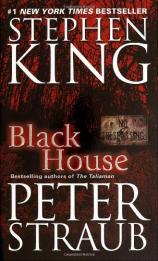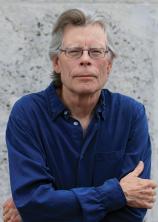Black House
Review
Black House
Jack Sawyer is back, older and, perhaps sadly, much wiser. His
special skills have made him one of the most noted crime stoppers
in the nation. Ironically, that is why he left his job as a
detective par excellence in Los Angeles and retired to French
Landing, Wisconsin, an Americana-ish small town of no special
repute, save for the recent disappearance and gruesome demise of
some of its children.
Like the western law man of old, who has long since put away his
guns, vowing never to fight again, Sawyer is drawn back to fight
the unspeakable evil that is terrorizing his new home.
King and Straub, both masters of the genre in their individual
rights, lull their readers with long descriptions of the people and
events that have recently (or will soon) take place. Their method
for this disclosure is the use of a narrative figure, whose
identity is left to the reader's imagination.
The Fisherman is the mastermind here, bringing to mind a
pedophiliac Hannibal Lechter. Unsatisfied with merely doing in his
victims, he taunts their families as well as the authorities. It's
not a plea as is often heard --- "stop me before I kill again" ---
but rather a gloating, a conceit that he will never be caught. But
in fact, he is not working on his own.
Similar in nature to King's THE STAND, BLACK HOUSE pits a group of
well-meaning townsfolk, all of whom have been affected by the
Fisherman in some way, against this evil incarnate. Jack is aided
in his quest by Henry Leyden, a blind disc jockey with multiple
professional personae; his nephew, Dale Gilbertson, chief of French
Landing's keystone kop police force; Judy Marshall, mother of
Tyler, a child who possesses the same "gift" as Jack; and the
"Thunder Five," a group of intellectual bikers. Of course, there is
the usual assortment of "window dressing" and "red-shirts" (named
after those unfortunate supernumeraries on Star Trek; if they wore
the blood-colored tunics, it was a good bet they'd be dead before
the first commercial), who provide inadvertent aid to the villain
and comic relief for the audience.
The problem with sequels is that they take for granted that readers
of the current volume have read the precursors, in this case THE
TALISMAN. This can cause a bit of confusion, especially as the
current characters drift back and forth between worlds, and
references to the previous one lack clear explanation. Jack himself
has been to the alternate universe known as "the territories" and
knows better than anyone the dangers that lurk there and what needs
to be done to bring Ty back and destroy the portal to the evil
world once and for all. But as we've come to see, nothing is ever
final when it comes to books like this.
Also, like novels of this type, there is the requisite amount of
gore for gore's sake. The chills are often predictable, and the
authors seem to rely on gory descriptions to make up for the
occasional lack of mystery.
Collaboration is a tricky thing. Several years ago, Jim Bouton,
author of the watershed BALL FOUR, teamed up with Elliot Asinof,
whose EIGHT MEN OUT served as the definitive work on the 1919 world
series gambling scandal, to produce STRIKE ZONE. The
differentiation in voices were obvious. Written in first person,
the story went back and forth between a star pitcher and an umpire
considering the inconsiderable: cheating on his calls to cover a
gambling debt of a friend. BLACK HOUSE is much less discernible in
divining each author's contribution. Perhaps hard-core fans of each
writer will be able to pick out their unique characteristics. One
thing is for sure --- given the reputations of each, the book is
certain to be a bestseller.
Reviewed by Ron Kaplan (ronk23@aol.com) on January 21, 2011





